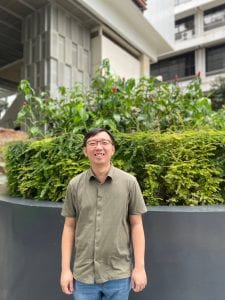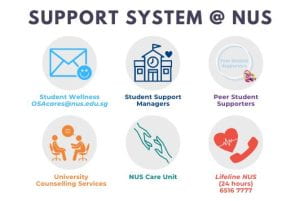We’re deep into Week 5, and by now, the semester is starting to heat up. You may start to encounter stressful and worrisome thoughts, and you’re wondering if there’s anyone you can talk to – just to get a load off your mind. Sometimes, we just need a neutral listening ear. The good news is that, right now – there is someone just like that, in your hostel.
Gearing up for this new academic year, NUS is building a team of Residential Wellness Managers (RWMs) to provide support to students residing at NUS hostels. That’s right! You’re probably curious now about what exactly an RWM is. To answer your questions, we’re going to get to know Mr Patrick Chan, the new RWM of UTown Residence (UTR). Read on!
Hi Patrick, would you like to introduce yourself?
Hi, my name is Patrick! About myself –. I have been working in education for 12 years. One fun fact is that I love rabbits. I have a rabbit, and I’m trying to train her to do some tricks (normal tricks, not magic tricks!).
Cool, what do you like about rabbits/your rabbit?
They are very tame and lovely creatures! Sometimes my rabbit does bite me, especially when she gobbles her treats greedily when I hand-feed her.
Patrick with his rabbit, Hayley
What have you been up to these past few months?
I have been learning from my boss and team members about this new role – the job scope and the processes. Our exchanges are fun, as there are many takeaways through them. I also went to Johor Bahru for a timeout – to eat, and relax before starting work!
Have you frequented or stayed at NUS before this?
I did my studies elsewhere, so I haven’t had the privilege to frequent and stay at NUS Kent Ridge campus. However, six years ago, during my undergraduate studies, my friends brought me to UTown to study. There have been a lot of changes made over the past few years. I was pleasantly surprised upon my return to UTown.
You mentioned that you have been in education for 12 years now. Could you tell us more about how your role has evolved?
Interestingly, my role has evolved, and yet remained the same – I worked in programme, student management, as staff advisor to student council and a counsellor. In my current role of supporting students, there are similar themes – I now support students in a different capacity, in terms of mental health, as compared to some of my previous roles.
How has student wellness evolved in general, in your opinion?
I feel that it has evolved dramatically in the past few years. When I first started out in the education sector, one barely knew what a counsellor was, beyond their existence. Mental health has become more heavily discussed and emphasised in recent years. This is a very good thing, as the reduced stigma towards the topic of mental health has enabled more students to be more willing to reach out to counsellors, and the like, for help.
Student wellness support system in NUS (Source: OSA)
What do you think has inspired this shift in focus?
I think that it started during the COVID-19 period – there were more mental health cases like depression and suicidal ideations, likely because Singapore citizens and youths had lesser outlets to relieve their stress. Students have revealed to me that because they could not go out, nor interact with anyone physically due to online lessons, they felt very lonely and isolated at home. Online interactions are not ‘real’ interactions – they are unable to see each other’s faces, and they cannot enjoy the process of having that ambience and atmosphere of proper conversation or activities with their friends.
How do you feel about being the RWM for UTR?
I am excited to be assigned to UTR, and to support the community here. I think that all hostels are unique, and every hostel would have their own way of taking care of their residents’ mental health. Ultimately, our goal is the same – for residents to enjoy their campus life and be happy.
We currently have rest-stops, called a PitStop at the Faculty of Science. There will also be a PitStop in UTown down the road, where RWMs will be on standby to support students from the different hostels in UTown. Students can look forward to that!
Considering the demographic of UTR residents, in your opinion – how would the mental health needs of postgraduate students differ from that of Undergraduate students?
In my experience with PhD students, many of them have to do their own projects, theses, essays, labs, conferences and such. With all of these different commitments, many of them have less time left to rest and relax. It is hence even more important for these students to carve time out to practice self-care.
What advice do you have for students reading this article?
Don’t ruminate on the past, or the future. Focus on what you are doing now. Take some time from your busy schedule to take a break, and do things that you enjoy.
What are some self-care activities that you enjoy doing?
Now that I have a rabbit, I play with her a lot in the morning before work and at night, when she’s the most active. I am also reading fiction novels with exciting storylines, many of which are translated novels found online. I also enjoy taking walks in parks such as Botanic Gardens, enjoying the different sceneries there, as well as enjoying the moment itself.
What events can students look forward to from the larger Student Wellness team that you’re part of?
Student Wellness will be organising a Wellness Festival in October 2022, and there will be many workshops available for students to attend – either at UTR or even at their own faculty! It is also intentional that NUS WellNUS month falls together with the World Mental Health Day falls in the month of October – a perfect time to embrace self-care.
Student Wellness has come up with the 7 PitStop Principles (which are evidence-based) – all workshops are linked to these principles, which are self-care tips for students to adopt. I encourage you to find ways to weave these principles into your life, to breathe easier.
The 7 PitStop Principles
Any parting thoughts?
Humans are creatures of habits and our habits shape us – if a person adopts the right habits, I believe that he/she will be able to feel better mentally.
Thank you, Patrick, for your rich and thorough insights! We hope that our readers now better understand the new RWM role, as well as about Patrick as a person. If you have any other thoughts or queries, do leave us a comment, or post about it on Instagram and tag us @nusresidentiallife, we would love to hear about it. Meanwhile – we’ve compiled a short Q&A for questions we thought you might ask after reading this article. Scroll on to read!
Who should I approach? The Residential Wellness Manager (RWM) or Student Support Manager (SSM) of my faculty?
The short answer is: It does not matter – both are good options! NUS is committed to your mental health and wellness. Both the RWM and SSM can provide support to the residents with personal or mental health issues. It is really up to you who you want to talk to. The RWM and SSM are trained to refer you should you need other help and resources. You can discuss topics like academic concerns, relationships, personal goals and mental health challenges etc.
Can you tell me more about the RWM role?
An RWM’s main role is to provide emotional support to the residents with personal or mental health issues. They do check-ins and follow up with residents who are feeling overwhelmed or suffering from mental health challenges. RWM can also refer you to the University Counselling Services or University Health Centre if required. They can also accompany residents to see the counsellors especially when students are feeling uncomfortable or anxious about it.
What about the SSM?
An SSM also plays a supportive role similar to the RWM. In addition, if your concerns relate to academic issues, it would be ideal to make an appointment to see them first. SSM can advise on matters regarding modules, Leave of Absence and candidature.
Will other people get to know what I share with the staff?
The matters that you discussed are private. However, in order to render help, there are times that other parties need to be informed. Talk to your RWM or SSM about this.
I still think it is embarrassing to approach someone for help when I have some stress.
All of us go through some form of challenges and struggles from time to time. Asking for help is not a sign of weakness but it is a sign of strength that you want things to get better! Seeking help from a RWM or SSM can provide you with other perspectives and options to your challenges and help you better cope with your concerns.



